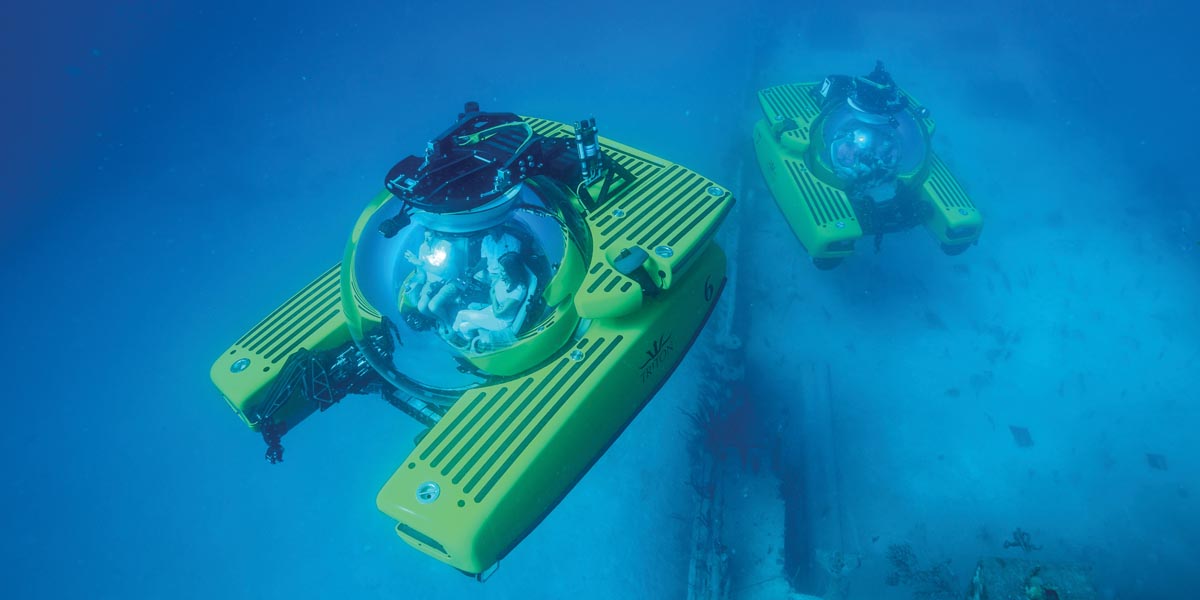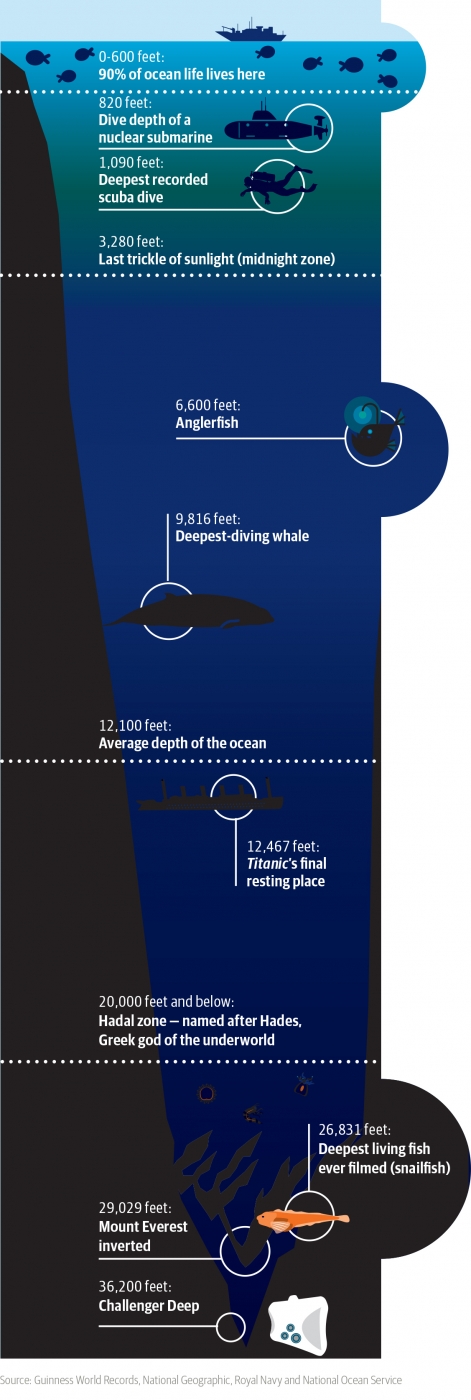Four thousand people have scaled Mount Everest, tens of thousands have visited Antarctica, and even the Moon has had a dozen visitors leaping through its dust.

Uncharted waters
Article last updated 19 February 2023.
Article by, Ian Tansley, Regional Director, Rathbones
Until recently the bottom of the ocean presented the biggest challenge to travellers. But that is all changing. Welcome to the world of deep-sea tourism.
Close to seven miles beneath the Pacific Ocean surface, at the southern end of the Mariana Trench, lies the deepest point on Earth. Known as Challenger Deep — after HMS Challenger, which first sounded the spot in 1875 — it is a mile deeper than Everest is high.
In 2012 James Cameron became only the third person to touch its floor. The director of classic films like Titanic, The Abyss and Aliens plunged solo in his deep-diving submersible, Deepsea Challenger.
This is a world that sees no sunlight. Temperatures are freezing, and the pressure is immense — the equivalent of 291 fully loaded jumbo jets on your head.
But even at the bottom Cameron found life. He recorded sightings of small amphipods — shrimplike bottom-feeders. Scientists studying footage from his voyage believe they have also identified a new species of sea cucumber — “like a fat worm with long feeding appendages”.
“There are more species to be discovered in the ocean than have ever been seen on land.”More recently the fourth person to visit the site, American private equity investor and undersea explorer Victor Vescovo, found something more depressing — a plastic bag.
In 2019 Vescovo completed a record-breaking expedition to map and visit the bottom of all five of the world’s oceans in his British-designed submarine, Limiting Factor.
Research and tourism
Soon visiting the ocean bed may be as common as climbing Everest — something Vescovo has also done. Isle of Man-based Eyos Expeditions helped Vescovo fund another expedition in June this year to take seven more people to Challenger Deep in individual trips. At least one of them paid $750,000 for the privilege.
This was the first time the general public has been offered tours into the ‘hadal zone’, the murky depths of 20,000 feet and further beneath the waves, named after Hades, Greek god of the underworld.
Slightly more mass-market, another company is offering to take five crew at a time on its new vessel, Titan, to visit the Titanic, some 12,500 feet below the surface of the Atlantic, in 2021. Titan, a 22-foot-long submarine that has a five-inch-thick carbon-fibre shell, can dive to 13,000 feet.
Stockton Rush, founder and CEO of OceanGate, which is organising the six-week trip, wants to combine research and tourism. He says: “That was how exploration was funded in the past — through wealthy donors. Every dive we do has a mission. On the dive to RMS Titanic scientists and citizen explorers will collaborate to survey and document the world’s most famous shipwreck. The scientific goals include assessing wreck decay, surveying marine life and creating archaeological maps.
“We recognise that this historic site is a memorial, and we are committed to undertaking our mission with great respect for those who lost their lives during the tragic sinking in 1912. We will not disturb the site or remove artefacts.”
“Everyone who travels into space and who has the good fortune to travel beneath our oceans becomes an environmentalist.”Each week nine tourists will join the expedition crew and be trained as what Rush calls “mission specialists” to carry out dive support roles, like navigation and sonar or laser scanning. They will each complete one nine-to-10-hour dive to the historic wreck with a pilot, a scientist or a Titanic expert and two other tourists. They will pay $125,000 for the opportunity.
Space parallels
Deep-sea exploration may be becoming more common, and no-one has ever been killed in a modern deep-sea submersible. But the risks are still there. Trips are always unpredictable.
Cameron’s famous voyage was supposed to give him a six-hour stay on the ocean floor. It was curtailed to three after a hydraulic fluid leak caused the loss of the submersible’s starboard thrusters.
Rush has been trying to run a trip to the Titanic for a couple of years. His first bid was thwarted by lightning, the second by ship problems. He hopes next year will be third time lucky.
Explorers repeatedly compare themselves with astronauts — they call themselves aquanauts. Indeed, the first woman to visit Challenger Deep this year was NASA veteran Dr Kathy Sullivan — also the first woman to walk in space.
Jim Delgado, once the chief scientist mapping the Titanic, says: “What we’re doing is tapping into the final frontier. Beneath the ocean I can boldly go where no-one’s gone before. I can seek out new life as well as evidence of past civilisations.”
Rush, who has an aerospace engineering degree and always wanted to be an astronaut, says: “Spaceships and submarines are similar. They have to deal with some of the same challenges, like recycling air and how you go to the bathroom.”
Fragile planet

Dr Scott Parazynski is a veteran of five Space Shuttle flights. He has discovered the thrill of deep-sea exploration and plans to join Rush’s Titanic trip. He says: “Space flight makes you feel infinitely small. When you look back on your home planet and see this beautiful orb beneath you, then turn 180º and see the vastness of the universe and trillions and trillions of stars, you realise what an oasis our planet is. It makes you feel very appreciative and humble.
“Deep-sea exploration is similar. Everyone who travels into space and who has the good fortune to travel beneath our oceans becomes an environmentalist, because you realise how fragile our ecosystem is and how lucky we are to even be alive.”
Rush shares that environmental passion and believes that it is important to open the opportunity to more people. He says: “I had an epiphany that if I couldn’t be an astronaut I wanted to be an explorer. I built a two-person sub, and on my first dive I was just amazed at how different it was from scuba diving and how incredible the experience was. I thought everybody needs to go underwater.
“If you look at liveable volume, 98% of the planet is ocean. There are more species to be discovered in the ocean than have ever been seen on land, yet most of the world doesn’t know that. When I learnt to scuba dive my instructor would say: ‘Below 130 feet? You don’t want to go down there, because there’s nothing down there.’ That’s been proven to be false.
“So many amazing things are underwater that it’s humbling as a human to say we’ve been on this planet all this time and we’re only now getting any kind of understanding of the deep ocean.”
This article has been taken from, 'Rathbones Review Autumn 2020' read the full publication here.







